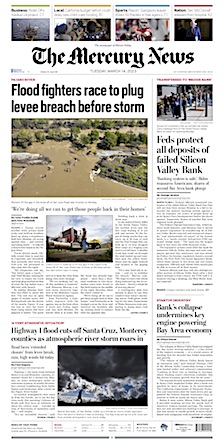
The Mercury News
The Mercury News (formerly San Jose Mercury News, often locally known as The Merc) is a morning daily newspaper published in San Jose, California, in the San Francisco Bay Area. It is published by the Bay Area News Group, a subsidiary of Media News Group which in turn is controlled by Alden Global Capital, a vulture fund.[6][7] As of March 2013, it was the fifth largest daily newspaper in the United States, with a daily circulation of 611,194.[8][9] As of 2018, the paper has a circulation of 324,500 daily and 415,200 on Sundays.[10] As of 2021, this further declined. The Bay Area News Group no longer reports its circulation, but rather "readership". For 2021, they reported a "readership" of 312,700 adults daily.[11]
For the Australian newspaper, see The Mercury (Hobart).First published in 1851, the Mercury News is the last remaining English-language daily newspaper covering the Santa Clara Valley. It became the Mercury News in 1983 after a series of mergers. During much of the 20th century, it was owned by Knight Ridder. Because of its location in Silicon Valley, the Mercury News has covered many of the key events in the history of computing, and was a pioneer in delivering news online.[12] It was the first American newspaper to publish in three languages (English, Spanish, and Vietnamese).[13]
Coverage[edit]
The paper's local coverage and circulation is concentrated in Santa Clara County and San Mateo County. With the Mercury News, East Bay Times, Marin Independent Journal, and Silicon Valley Community Newspapers, the Bay Area News Group covers much of the San Francisco Bay Area with the notable exception of San Francisco itself.[6]
The Mercury News's predecessor, the Weekly Visitor, began as a Whig paper in the early 1850s but quickly switched its affiliation to the Democratic Party.[14] The paper remained a conservative voice through the mid 20th century, when it supported pro-growth city leaders and pursued a staunchly pro-growth, anti-union agenda.[12] It became considerably more moderate in the 1970s, reflecting new ownership and changes to the local political landscape.[15] It endorsed John B. Anderson for president in 1980 and endorsed Democratic presidential candidates in every election from 1992 through 2016.[16]
History[edit]
Early history[edit]
The newspaper now known as the Mercury News began in 1851 or 1852.[note 1] California legislators had just moved the state capital from San Jose to Vallejo, leading to the failure of San Jose's first two newspapers, the Argus and State Journal. A group of three businessmen led by John C. Emerson bought the papers' presses to found the San Jose Weekly Visitor.[2] The Weekly Visitor began as a Whig paper but quickly switched its affiliation to the Democratic Party. It was renamed the Santa Clara Register in 1852. The following year, Francis B. Murdoch took over the paper, merging it into the San Jose Telegraph.[14][18][19] W. A. Slocum assumed control of the Telegraph in 1860 and merged it with the San Jose Mercury or Weekly Mercury to become the Telegraph and Mercury. William N. Slocum soon dropped Telegraph from the name.[20][21] By this point, the Mercury was one of two newspapers publishing in San Jose.[14]
Awards[edit]
The newspaper has earned several awards, including two Pulitzer Prizes, one in 1986 for reporting regarding political corruption in the Ferdinand Marcos administration in the Philippines, and one in 1990 for their comprehensive coverage of the 1989 Loma Prieta earthquake. Assistant managing editor David Yarnold was also a Pulitzer Prize finalist in 2004 for a local corruption investigation.[77] The Mercury News was also named one of the five best-designed newspapers in the world by the Society for News Design for work done in 2001. In 2007 the newspaper won a Missouri Lifestyle Journalism Award for General Excellence, Class IV.[78]
Various staff writers and designers have received awards for their contributions to West magazine, a Sunday insert published by the Mercury News in the 1980s and 1990s.
The Mercury News website received EPpy Awards in 1996, 1999, 2009, 2013, and 2014.[79]
Controversies[edit]
In August 1996, the Mercury News published "Dark Alliance", a series of investigative articles by reporter Gary Webb. The series claimed that members of the Nicaraguan Contras, an anti-government group organized with the help of the Central Intelligence Agency, had been involved in smuggling cocaine into America to support their struggle, and as a result, had played a major role in creating the crack-cocaine epidemic of the 1980s. The series sparked three federal investigations, but other newspapers such as the Los Angeles Times later published articles alleging that the series' claims were overstated. Executive editor Jerry Ceppos, who had approved the series, eventually published a column that suggested shortcomings in the series' reporting, editing, and production, while maintaining the story was correct "on many important points".[80][81] The series was turned into a 1998 book by the same name, also by Webb, and an account of the controversy surrounding the series was published as Kill the Messenger in 2006. Both were the basis for the 2014 film Kill the Messenger.
The Mercury News publishes the following community weeklies:[84]